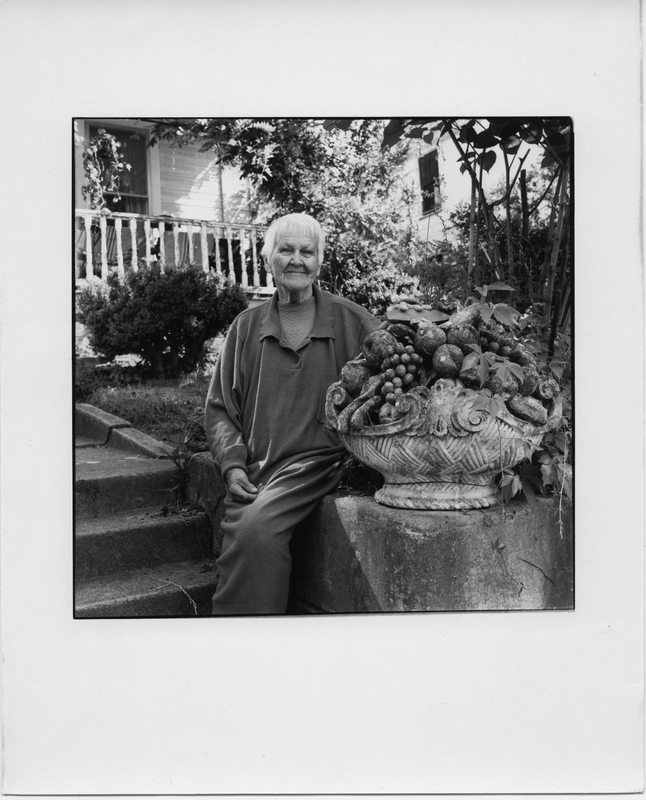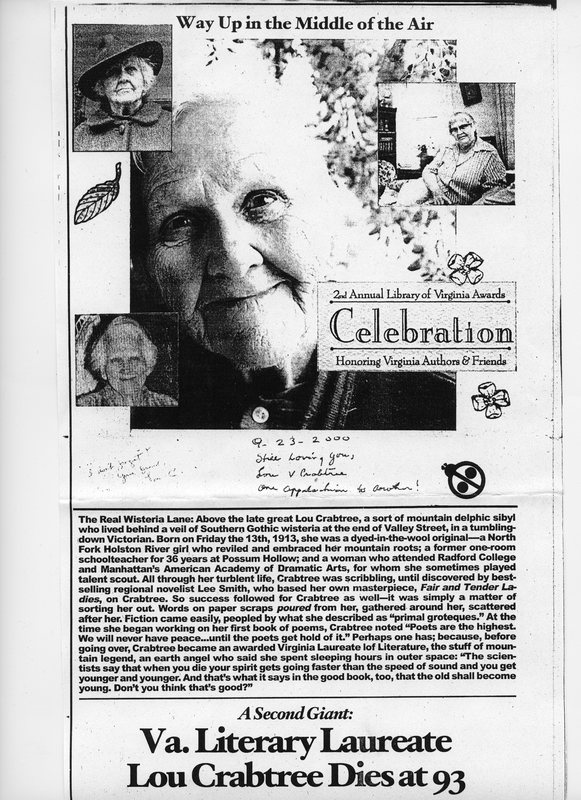The Spirit Years
Paradise Regained
"jesus jesus I got something
this old body ain't so important
in this old body I feel holiness
i got jesus flirtin with death."
["Salvation," The River Hills & Beyond]
"Lonely forever
For one
Gone Gone"
["Gone," poem written upon the death of Lou's daughter in 1996. From: "What kind of egg are you? A Profile of Lou Crabtree," Judy Miller (90)]
"Now in my porch years, I am pursuing two things at this late time in my life: spiritualism and space." [ibid (88)]
At first glance, these pursuits would appear antithetical: one looking inward and the other outward. Lou does refer to her "fragmented self" in a poem called "Bio Info" written in 1995. In fact there are many such antithetical strands in her work. In her space poems, written during this later stage of her writing career, she says she wanted to find out about space because she wanted to know where paradise was. "Scientists say that if you can go faster than the speed of light you'll get younger..." [Johnson, "Porches in Paradise."]
Getting younger by going faster, even as we age (and go slower); the struggle to maintain personal identity, something unique and enduring in a dynamic, mutifarious world; seeking connection in a life that at times seems calculated to tear us apart. Paradoxes such as these have occupied poets going back to ancient times.
"A poem should begin with a question about life and end with a bigger question. The bigger the question," Lou suggests, "then maybe the poem is immortal." [Miller, "What Kind of Egg..." (90)]
One way to examine these paradoxical sentiments would be to consider different views of time. For Western Civilization, time is linear. The very notion of progress, which is foundational to our culture, implies a point where there is some type of crude beginning from which we progress, carried forward into the present and, with luck, on into the future. Native American culture (along with many Eastern cultures), look at time as being cyclical—or circular. They speak of "The Sacred Hoop," and "The Power of the Circle." They point to the the fact the earth circles around the sun, which gives us the four seasons, as well as the directions (east being where the sun rises, setting in the west; north and south being the direction of our ocean currents, which bring about seasonal weather patterns). Equally important in these cultures is the balance that must exist to keep these elements in harmony.
Lou Crabtree studied Indian culture first hand in "Hogoheegee, Washington County, Virginia." Growing up she had such an appreciation for their culture that she was "ceremoniously adopted by the Cherokee who gave her the Indian name Grandmother Wolf Woman." ["Porches in Paradise"]
Cycles—circularity—was central to Lou Crabtree's work. In her porch/spirit years she recalled the "great circle of animals who would travel down Rich Valley from Saltville to drink from special springs in Smith Creek."
"But Crabtree expands the circle to include humanity and spiritual beliefs. In one of her latest poems, "Paradise," she completes the thought. Did God prepare Earth as a Paradise, she queries? And did God not prepare another Paradise, she continues,
"Where we leaving, going
towards His heaven, if you please,
toward that other paradise."
["An Abingdon Treasure: Author Lou Crabtree reflects on her life & works," Carol Fields]
Lou Crabtree reading her poem "Salvation (YouTube)
The poem was part of Lou Crabtree's Memorial program when she died in 2006.


